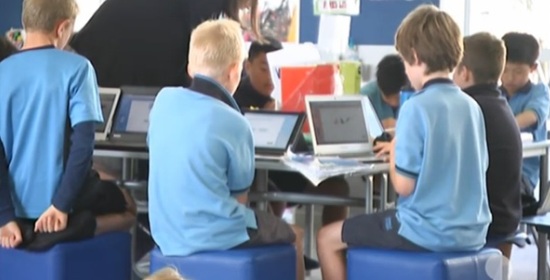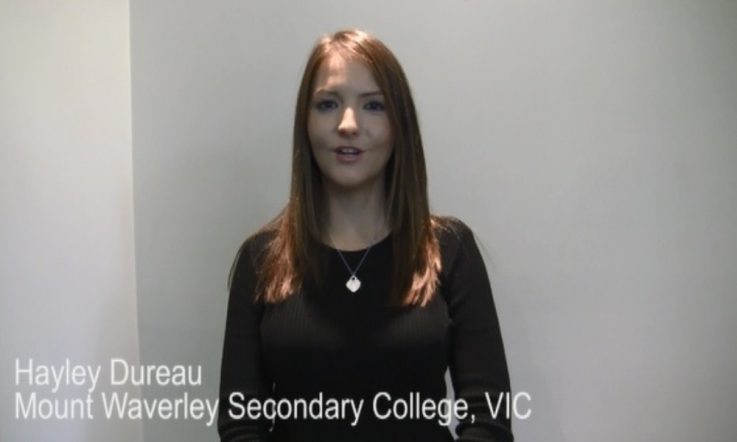Hello and thank you for downloading this podcast from Teacher magazine – I'm Rebecca Vukovic. Welcome to the second episode of our series on school-based action research, where we chat to teachers on the ground about the process of action research, and the impact that it has made on their school. Today, I'm with Nikki Urlich from Campbells Bay School in New Zealand. Three years ago, Nikki and her colleagues started a collaborative project called Modern Maths where, in an innovative learning environment, 120 nine-year-old learners come together to work with a team of four teachers. I asked Nikki to explain to listeners what the Modern Maths project actually is.
Nikki Urlich: Modern Maths is the learning and teaching of mathematics based on modern pedagogy. So, when I talk about modern pedagogy, what I mean is we have redesigned the teaching and learning of maths with a group of students and teachers, based on three parts. So student agency is one of the biggest fundamentals of Modern Maths, a modern learning environment is another part, and then we use a modern pedagogical approach.
In terms of student agency, when we teach and learn maths we believe that students need to own the learning and the assessment so students are actually assessing themselves, looking at the progressions, highlighting where we need to be – and I'm talking eight- to 10-year-olds, And what they have within this mathematics program is a lot of voice and choice.
So that's the student agency side, but in terms of the modern learning environment the actual environment is different to traditional classrooms, it's not single cell teaching. We have a block where it's more of an open plan space with different learning settings and breakout spaces. And so, for example, one area is called the ‘green room' which is a quiet room where children can go and do their mathematics if they want a quiet space. We have the collaborative space which is quite big, it's probably the size of two traditional classrooms, where the furniture and technology is set up so kids can collaborate and work together. And then we have breakout spaces, one is called the ‘orange room', which is quite a big room filled with materials and that's where kids go to do their knowledge building in mathematics. And then we have glass spaces where teachers are actually explicitly teaching, even though we have a teacher walking around the blue and green rooms supporting kids with their independent maths.
So, the environment looks very different. Also it's got five teachers and say 140 learners within the space so it's not your ‘one teacher to 30 kids' kind of mentality. So that's in terms of how the learning environment is different. Also, peer learning is a big part of it so kids are sitting down with students that might not be of the same ability, it might even be their best friend and they're sitting down and they work together because the students choose where they're working and who they're working with.
And then the third one that I talked about is our pedagogical approach is different. It is based on problem solving. We teach and explain to the students that as a mathematician you need to build knowledge, specific sets of knowledge as a mathematician, you need to problem solve real mathematical life problems, and you need to be able to do those two things independently. So that's what happens during Modern Maths, those three things.

Rebecca Vukovic: Fantastic. And how did you come up with the idea for this approach?
NU: One of the catalysts for it was we were getting what we call a MLE (modern learning environment) or an ILE (innovative learning environment), so this building was a $3 million build. When we were designing it we decided to do a year-long teacher inquiry – our action research into modern learning practice and what it should look like in this environment. And, we started with maths. Mathematics is one of those quite black and white content parts of the curriculum that you can have good knowledge as a teacher of. So we decided to look at the structures and processes around it and what it could look like in this new environment.
Over a year a group of nine teachers and myself did the research into what it could look like – we visited other schools that were doing it, we looked at Melbourne in Victoria which is doing a lot of work in this area and then we started looking at current research with [John] Hattie and everyone about what learning needs to happen for these kids … we're quite a future focused curriculum developer. So, we just immersed ourselves and looked at opinions and different learning settings and that's how we came up with the prototype called Modern Maths.
RV: Since you started this project, what data have you been collecting along the way?
NU: So obviously bottom line is student achievement. We've been tracking student achievement and getting the data. When we started this probably three years ago I started collecting data, students were still learning in the traditional maths setting, one teacher [and] 30 kids in their own classrooms, and so I started getting data mid-year, end of year, and so we've continued that so we're getting student achievement data.
What we're also getting data on is teacher workloads. So, the idea of five teachers collaborating within this mathematics program – and its actually nine teachers because it's two different groups doing it at the same time – we've been monitoring teacher workload to see how that changes which has been exciting obviously for teachers because it's a very busy job. Student engagement is another thing we've been collecting and I've been collecting student voice and student dispositions around mathematics.
RV: And how are you actually measuring the progress that's being made?
NU: Again tracking the student achievement we're seeing what's happening in terms of progress with our levels within the curriculum – you know at or below national standard. We also get the teachers to track progress of each group they're teaching. Using collaborative Google Docs and things like that, we're actually tracking each child we teach within a workshop that they sign up for each day. And then the students – this is probably the most important thing because the whole thing is based on student agency – the students track their progress. So they're the ones marking their formative and summative assessments; they're the ones that are highlighting their progressions and talking about where they sit in the curriculum. And then obviously my sixth monthly formal tracking, I'm up to the third set with the first group of students that started doing Modern Maths, so we're about to analyse the third set of formal data that we have about these students.
RV: What were some of the challenges you encountered along the way as you were implementing the Modern Maths project?
NU: The biggest challenge, and this is what I speak about in my [education] talks, is communication with parents. Obviously it's a very different system and structure from the way that they were taught and because this current school (and a lot of schools I work with) have quite involved parents, if they don't understand the change or why you're doing it, they can be an obstacle and they can get quite passionate about it and it can impact on the kids coming to school, if their parents are viewing it quite negatively. So I think you need to get quite strategic about it and we did, we definitely did a lot of [communication] work with our parents and community. That was one of the obstacles.
Number two is teacher's worries and fears and again I think you're going to need to be strategic in leadership if you're going through quite a significant change management process in terms of pedagogy. You need to be talking about what they're worried about, that was part of our year-long inquiry into what could it look like, what could this modern practice look like in a new environment and actually getting the teachers to say ‘I am actually scared about this, how am I going to track students and how are we going to share this information'. It turns into an opportunity.
Other challenges … tracking. So we've got our tracking sorted now, but we are a year-and-a-half into the program. At the beginning, because you have 120 students you might see and you're not always with your own class group – which is the way it's organised – how do you know your students as a mathematician and how are we making sure that students don't go under the radar? That's something over the last year-and-a-half that we've developed, but it definitely was a challenge at the beginning.
RV: Fantastic, and just finally Nikki, if you were to offer one piece of advice to other educators who are looking to conduct action research in their school, what would it be?
NU: Definitely student voice. I think sometimes we gloss over this as teachers and educators. We do think we know about our learners and we make a lot of assumptions and during the last five years that I've been doing action research, if you actually stop and really investigate what students are saying, thinking, feeling, their knowledge, then your action research is going to have such a big impact.
For example, it wasn't until we really sat down and looked at the dispositions of the kids in terms of how they were feeling about mathematics, that we started to gauge their level of ability to take risk. We all know that you need to take risks as a mathematician, and it's not until you start to ask kids to rate themselves in terms of contributing ideas or how comfortable do you feel asking a teacher a question or how comfortable do you feel telling your peer that they got it wrong, and you really start to break down what does it mean to take a risk in mathematics, that if you don't know your students and you don't apply teaching strategies to make an impact on those actual kids that you're doing the research for, then your impact is not going to be that great.
And so student voice and really exploring the learner or the focus of your research.
RV: Nikki Urlich, thank you very much for joining Teacher magazine.
You've been listening to a podcast from Teacher magazine. To download all of our podcasts for free, visit acer.ac/teacheritunes or www.soundcloud.com/teacher-acer. To find out more about the research discussed in this podcast, and to access the latest articles, videos and infographics visit www.teachermagazine.com.au
Have you conducted an action research project at your school? What was the impact of the research and how did you track the progress that was made?
Nikki Urlich says it is important to investigate 'student voice' in your classrooms. How often do you take the time to consider what your students are saying, thinking or feeling?



